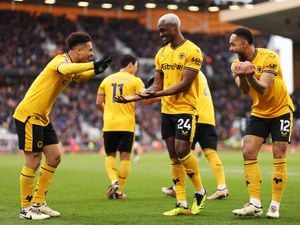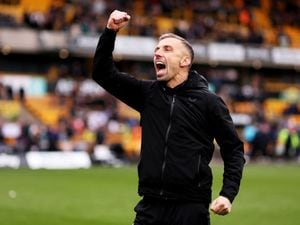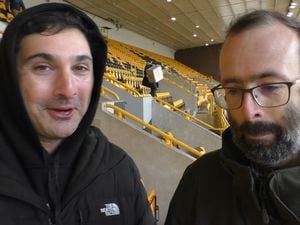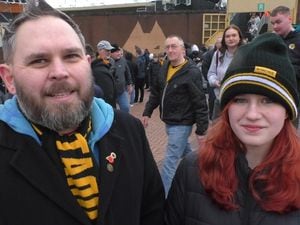Johnny Phillips: Adaptable Gary O’Neil is proving to be Fosun’s flexible friend
“They’ll plan the game around us,” said Newcastle’s Eddie Howe when we spoke in the tunnel before last Saturday evening’s match at Molineux against Wolves. That comment struck a chord. It is rarely, if ever, that a manager acknowledges anything like that when assessing the opposition’s strategy. And it is the clearest indication yet of Gary O’Neil’s methods in his early days at Wolves.
It was O’Neil’s planning for the opposition that marked him as the stand-out contender, in an albeit limited field, when the Wolves post suddenly became available just days before the beginning of this season. Whereas interviewees such as Frank Lampard had more experience and gravitas, O’Neil essentially told Wolves’ recruitment team how he would tackle every different challenge that the Premier League offered and demonstrated his preparation with detailed opposition analysis that far exceeded anything the other contenders could produce.
Everyone at the club, from the supporters on the South Bank to the suits in the boardroom, wants Wolves’ novice head coach to remain at the club for many seasons. If that happens it means O’Neil’s time here has been successful and the club will have further established themselves in the Premier League.
Wolves lost their way after the pandemic when they struggled to replace Nuno Espirito Santo effectively. There have been some particularly tough times over the past year. With Bruno Lage dismissed in early October 2022, the team managed only four points from 21 under the interim stewardship of Steve Davis and James Collins. Then Julen Lopetegui arrived to significant fanfare in November, before his untimely departure in August.
Nuno was the last manager to put a genuine imprint on the team. What is intriguing about the early weeks of O’Neil’s tenure is that he is almost the polar opposite in strategic terms. It is far too early to make a fair assessment of the new head coach with such a relatively small sample size, but whereas Nuno was wedded to an idea based on the opponent having to change, O’Neil’s point of difference is his adaptability in the face of the opposition in front of him.
There is no right or wrong approach, but the two ideologies reflect the circumstances of their time. When Fosun turned to Nuno in 2017, the manager and his coaching staff had already worked together for five years. In the small Portuguese fishing town of Matosinhos, just north of Porto, where Nuno and his close confidante and neighbour Jorge Mendes lived, the pair discussed who would be signing for Wolves several weeks before the appointment was even made. With Fosun’s backing, a comprehensive transformation in culture and playing style was introduced which brought immediate results.
“Everything we did was about the shape and the rules of how we played within the shape,” defender Ryan Bennett explained. “It took years of work by the time we reached Europe, but it was implemented straight away when Nuno arrived.”
O’Neil did not have time to plot his strategy over lunch with a super-agent. Instead, he was on holiday lying by the hotel pool when the call arrived. Fosun were not looking for a man to lead a project, they needed an adaptable figure who could work with a squad that had been shorn of some of its most established talents.
O’Neil is the ultimate pragmatist who is realistic about how to win matches. “How far away from my ideal do I have to move to give us the best chance of winning the game?” he asked. He acknowledges there are times when Wolves are technically inferior to the opposition but he is not afraid of them.
Crucially, he needed results to come quickly and the win at home to champions Manchester City was worth far more than three points. It ensured the “buy-in” necessary to take a squad of players on the journey he wants.
O’Neil has already switched from a back four to a back three and within that formation the plan is ever-changing, depending on the opponent. Speaking on Sky Sports’ Monday Night Football he illustrated a 4 v 3 overload against Bournemouth, achieved through a diagonal map across the middle third of the pitch, which led to the equaliser in a 2-1 win.
As Howe predicted, Wolves’ approach to overloads against Newcastle was different, based around creating space for wingers pushed inside high fullbacks. A goal was not scored directly on this occasion but how was the corner won for Mario Lemina’s headed opener? It was Nelson Semedo hugging the right touchline who found Pedro Neto inside him in space to get a shot away, which Nick Pope palmed over for that corner.
On the opposite flank, Rayan Ait-Nouri hugged the touchline when Wolves were in possession on the left, leaving Keiran Trippier unsettled and unable to dominate the game as he did in Newcastle’s 4-0 win against Crystal Palace.
There will be a different methodology for Sheffield United this afternoon and although the players’ roles are changing from game to game, there is now a clear understanding of those roles.
“From the first week we saw what he wanted to do but of course it wasn’t going to happen from that first week, it was hard.” Lemina said in his post-match interview. “We just kept going with the way he wanted to work and now we are trying to keep this mentality of getting points from every team.”
Nuno’s players spoke of their back five as a net, with players moving not in a straight horizontal line but swinging in sync as if attached by rope ensuring nothing could get through the centre. It would infuriate opponents who rarely wrestled the initiative.
“With Nuno it would be about controlling the game without the ball,” said Conor Coady. “That would come from forcing the opposition into areas where we wanted them to be. The ball would never come through the middle.”
What both head coaches have in common is their ability to paint pictures for the players. Nuno was a goalkeeper who saw the entire pitch in front of him. He spent most of his career as an understudy learning from managers such as Jose Mourinho. He was destined to coach. O’Neil was a fleet-footed midfielder, often at the centre of the action, but someone who knew his limitations.
“My lack of physical attributes provided my ceiling but I had a knowledge that my brain would help me after football, turning to coaching,” O’Neil said. “In youth football I was generally the smallest, never the quickest, and had to find ways to gain an advantage, and a lot of that was trying to be intelligent, understand the game and be ahead of people.”
He is a “first in last out” manager at Compton, setting an example to a group of players who have formed a strong bond. Sporting director Matt Hobbs has spoken about a new profile of player – young and hungry – now targeted to help the club going forward, which marks a change of approach from Fosun’s early years.
Wolves have been here before, of course. When the tap was finally turned off for good under Sir Jack Hayward in the summer of 2006, it proved a tipping point for Glenn Hoddle as senior players such as Paul Ince, Mark Kennedy, Kenny Miller and Joleon Lescott left the club. Similarly to Julen Lopetegui, Hoddle resigned in dramatic circumstances on the eve of the season. Wolves turned to Mick
McCarthy on that occasion who, on a limited budget, was over time able to deliver promotion and keep Wolves up for three seasons.
Football is about timing. O’Neil could never have been Fosun’s man in 2017 when the project was being lavishly built but this new frugal and circumspect chapter of ownership needs adaptability and value for money at its core. In these early days O’Neil is impressively providing that.





